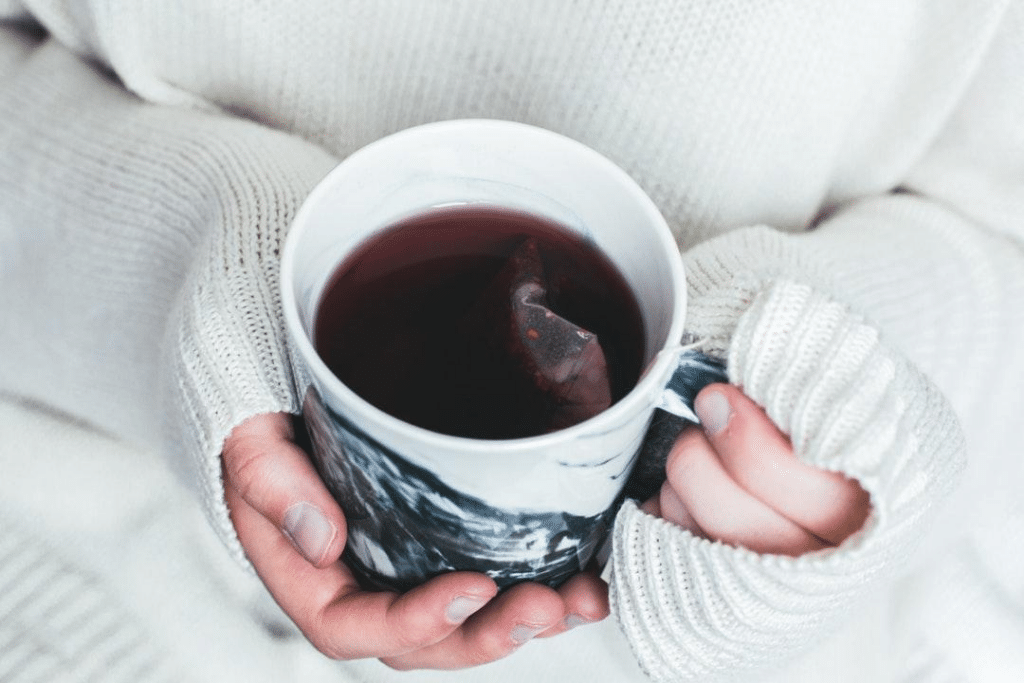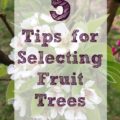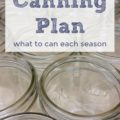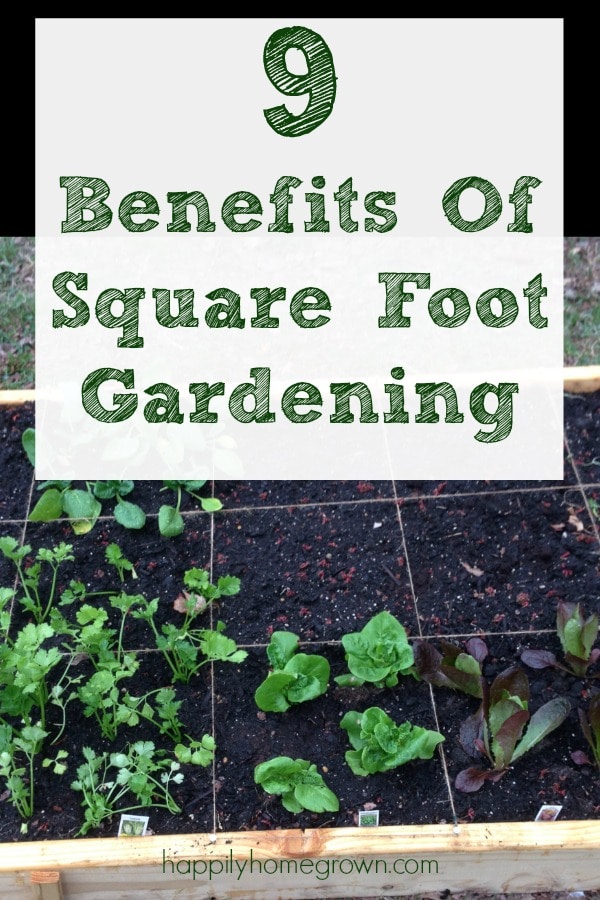Posts on Happily Homegrown contain affiliate links. When you make a purchase through an affiliate link, your price will be the same, but Happily Homegrown will receive a small commission. Thank you for your support!
Would you like plastic with your tea? That sounds like a pretty straight forward question, but it’s also a bit of a trick question. Not all tea bags are created equal and for those people who are trying to go plastic-free, it may be time to re-evaluate what’s in your cup of tea.

For years, I drank Lipton tea. Plain black tea in the little bags. When my son started our compost pile he looked up if you could compost Lipton tea bags specifically and found out that you can. Lipton tea bags are made out of unbleached hemp which is a natural fiber and can be composted.
But not the
And that’s when all of the years of hearing that you can compost tea bags came to a head. Tea leaves are totally compostable, but the reality is that so many of the tea bags we use are not.
Can You Compost Tea Bags?
The general rule of thumb is that if you are using a string-and-tag tea bag than most likely it is plastic-free. These bags are often made with unfiltered paper or hemp. There is often a tiny staple, which will oxidize and begin to break down with time. These tea bags can be composted.
Pyramid bags and “silken” bags look pretty, but they aren’t made with silk. The
Heat sealed bags, such as the round and square tag-less varieties, contain a small amount of plastic. The tea bag itself is often made with a natural fiber, however, natural fibers don’t melt and fuse together which is why the synthetic materials are added. These tea bags have a small amount of plastic thread that goes around the edge and then the heat seal melts the two sides of the tea bag together. These tea bags are not compostable.

Which Tea Bags are Compostable?
The first question is which tea bags are plastic-free. When doing research for this post, I found a lot of information on British tea companies. Of course. What is more British than a cup of tea? But American tea manufacturers weren’t so upfront with posting what’s in their tea bags on their company website or answering my questions when I called them directly.
Organic tea companies seem to be the most conscientious about what material is used to make their tea bags. Yogi Tea, Numi Tea, EDEN Organic, Organic Traditional Medicinals, and Two Leaves Organic Teas all have plant-based tea sachets. All of their tea bags are plastic-free and compostable.
Both Tetley and Lipton bagged black and green teas (regular and decaf) are in a standard string-and-tag bag. Both companies have confirmed, via this morning’s phone calls, that these tea bags are made with all natural materials, are plastic-free, and are compostable.

What are my options for plastic free tea?
Besides the tea bags from the companies listed above, you can always go with loose leaf tea. Loose leaf tea is all natural and compostable. You can use loose leaf tea to brew by the cup or an entire pot of tea.
I like classic black teas – English Breakfast, Irish Breakfast, and Darjeeling are my go to varieties and I have several tins of each in the pantry (along with my Lipton tea bags). When you brew your tea, you can use reusable cloth tea bags, ball infusers, or just leave the tea leaves in there and filter them out as you pour each cup.
To brew loose leaf tea, use 1 rounded teaspoon of loose tea for every 8 ounces of water. If you are brewing a pot of tea, use 1 rounded teaspoon of tea per cup of water, plus an extra teaspoon “for the pot”.
You Didn’t Mention The Tea that I Drink! Does it contain plastic?
There are so many tea companies that I couldn’t contact them all. If your favorite tea company isn’t listed, contact them. Ask them what materials they use to make their tea bags. Hold these companies accountable for what materials they are using, and if you don’t like the answer you get, be willing to switch brands. Your dollars are how you tell companies what products to continue making and what is acceptable or not to you and your family.
How to compost tea bags
Composting your natural-fiber tea bags is really easy. Just toss them into an active compost pile, cover with some brown material like straw or leaves, and let it be. Turn your compost pile as you normally would, and in time you will have beautiful nutrient-rich compost for your gardens.








Now, that is interesting! We are big tea drinkers, so you know I had to go check right away! And guess what – I will be calling Red Diamond. No strings. No staples. No tags. I think I’ll just go with loose. It seems so much safer!! Thanks for this great info!!!
After doing the research for this post, I’ve decided I’m switching exclusively to loose tea for at home. It will just make things easier and then I know what I’m getting.
Thanks for the information. It is safer to go with looseleaf tea.
And there are so many more options too!
One thing I been looking into is the amount of pesticides found in the tea. Definitely look into that too
We grow our own teas and use a tea ball
I’ve been wanting to do that. What do you grow in your tea garden?
Really Great post and I did know some of this as I have the sealing tea bags and I knew that there was smaller amount in there, otherwise the heat sealing would not work, having said that I do compost them.. What is left over in the compost gets screened out and I figure that its still a lot better then putting the whole thing in the garbage. I guess some might be considered about the leaching effect..
I make a lot of my own herbal tea’s and I buy tea bags that are composting.. I have at times given hubby heck over buying those kinds that clearly are not compostable
Every little bit we do to improve our own footprint in the world helps.
Hi Stephanine,
I do have some bagged tea, but I don’t buy the ones that have plastic. Usually I order loose leaf tea in bulk from Frontier Herbs. I started a buying club and they will ship for free if your order is $250 or more and you get wholesale prices. I have a small group that orders 4 or 5 times a year…which is plenty for me. 🙂
Good info! Thanks for sharing!
That’s awesome! I have a group of local friends that are avid tea drinkers so I’ll look into this. Thanks for the tip!
I have never heard of “Frontier Herbs” but I guess I should look them up.
But I also have Lipton tea bags at home so I “think” I’m safe for now.
You expect companies to be honest (but just look at Johnson & Johnson
and its fight against those claiming the powder causes cancer).
So interesting, I never knew! We drink a lot of loose tea and use a metal strainer ball. Thanks for sharing the post.
Stephanie, glad to see a post on this topic! I’m a lifelong black tea drinker and drink a LOT of it, so I always use loose leaf tea with an all-stainless steel infuser. Some infusers are part plastic. I figure if I’m drinking tea eight times a day, I would be ingesting a lot of who-knows-what if I used tea bags. We also drink some herbal “teas” (I prefer to call them tisanes) medicinally and buy those loose leaf as well. Pinning. #Pintastic
I didn’t realize some infusers contain plastic. I will have to keep my eyes open while shopping.
Hey there friend! Mr. Houseful and I are loose tea drinkers and he goes through a LOT of tea. We like using our tea ball or some tea kettle that brews in a pot for our teas because it makes us feel a bit fancier, AND speaks to my laziness in not wanting to rip staples out of tea bags. I’m horrid, aren’t I? Thanks for this post, and I would love it if you shared it in the garden chat when our links thread goes up! Happy Week to you!
It does feel a bit fancy using the pretty teapot instead of the tea bags, but I can’t help that it tastes better too! I’d be happy to share in the garden chat. Love what you do with We Sow We Grow!
I use an infuser and have some hemp bags to use as well for my own teas and tisanes that I buy. But that said I didn’t even give this much thought until I read this post. Thanks! I drink a ton of tea. It is my thing so this impacts me. I did but something on sale recently that has those silken bags you mention and I got it at a superstore grocery chain. Didn’t realize there’s plastic in that in all likelihood. Now I will change my habits.
I really didn’t think about it either until I wanted to compost my tea bags and a woman from the extension office told me that I can’t do certain ones. She didn’t even say which ones I couldn’t compost, but it was enough to start the wheels turning and do the research to share with all of you.
FYI, I have researched this a bit since I drink tea every day. Bigelow and Celestial Seasonings both make plastic-free tea bags and are committed to sustainable practices (especially Bigelow).
That’s awesome!
Not according to their Facebook page as of about a year ago (today is 8/30/24). In all of their main teas (the classic ones with the artwork and the pillow pouches) they still use food grade (and plant based) plastics in those tea bags making them not compostable. They do have a separate brand that does not contain microplastics.
Great Info, Thanks
I have spoken to Lipton and they say this is false information. This is a direct quote “Our Lipton teabags are mostly made of paper with a small amount of plastic which is used to provide strength to the paper to prevent it from falling apart when wet. A staple is also used to seal the teabag to the thread and tag.” When I referenced your article, they said it’s false information. Please update this article as it’s providing misinformation to everyone reading.
Please re-read the post. I said that the regular Lipton tea bags with the little staple are fine and able to be composted. Your conversation with Lipton confirms that. As for the “small amount of plastic” that you reference … that is the WHOLE POINT of the article. Most people don’t realize that there is a small bit of plastic in their tea bags and how that can ultimately impact the environment. I’m not changing the article and it is not false information.
So, what you are saying is that Lipton black tea bags do contain plastic? In the bag itself, or in the tea?? Your article quotes Lipton as saying there is no plastic in their bags.
The standard Lipton tea bag, that is folded and stapled does not contain microplastics. The tea bags that are pouches that are heat sealed around the edges do contain microplastics.